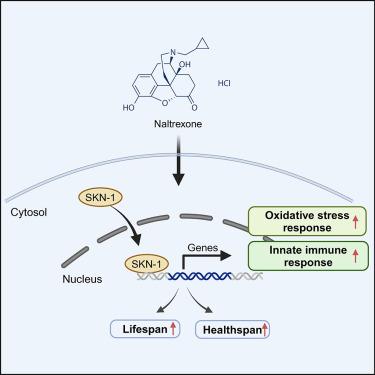Low-dose Naltrexone (LDN) extends healthspan and lifespan in C. elegans via SKN-1 activation
Weisha Li, et al.
Open Access Published:May 08, 2024
https://www.cell.com/iscience/fulltext/S2589-0042(24)01171-4
Highlights:
• Low-dose naltrexone (LDN) extends healthspan and lifespan in C. elegans.
• LDN promotes nuclear translocation of transcription factor SKN-1.
• Lifespan and healthspan extension of LDN depends on SKN-1.
• LDN activates the oxidative stress response and certain immunity genes.
Abstract
As the global aging population rises, finding effective interventions to improve aging health is crucial. Drug repurposing, utilizing existing drugs for new purposes, presents a promising strategy for rapid implementation. We explored naltrexone from the Library of Integrated Network-based Cellular Signatures (LINCS) based on several selection criteria. Low-dose naltrexone (LDN) has gained attention for treating various diseases, yet its impact on longevity remains underexplored. Our study on C. elegans demonstrated that a low dose, but not high-dose, of naltrexone extended healthspan and lifespan. This effect was mediated through SKN-1 (NRF2 in mammals) signaling, influencing innate immune gene expression and upregulating oxidative stress responses. With LDN's low side effects profile, our findings underscore its potential as a geroprotector, suggesting further exploration for promoting healthy aging in humans is warranted.
Graphical abstract








